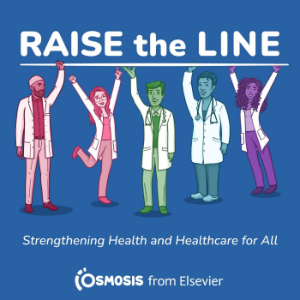
Raise the Line
Education Podcasts
Join host Lindsey Smith and other Osmosis team members for a global conversation about improving health and healthcare with prominent figures in education and healthcare innovation such as Chelsea Clinton, Mark Cuban, Dr. Ashish Jha, Dr. Eric Topol, Dr. Vivian Lee and Sal Khan, as well as senior leaders at organizations such as the CDC, National Institutes of Health, Johns Hopkins University, WHO, Harvard University, NYU Langone and many others.
Location:
United States
Genres:
Education Podcasts
Description:
Join host Lindsey Smith and other Osmosis team members for a global conversation about improving health and healthcare with prominent figures in education and healthcare innovation such as Chelsea Clinton, Mark Cuban, Dr. Ashish Jha, Dr. Eric Topol, Dr. Vivian Lee and Sal Khan, as well as senior leaders at organizations such as the CDC, National Institutes of Health, Johns Hopkins University, WHO, Harvard University, NYU Langone and many others.
Language:
English
Contact:
(802) 324-8166
What’s At Stake In Changes To Medicare and Medicaid: Chiquita Brooks-LaSure, Senior Fellow at The Century Foundation
Duration:00:32:39
Expanding the Gene Therapy Toolbox: Dr. Bobby Gaspar, Co-Founder & CEO of Orchard Therapeutics
Duration:00:35:16
Rare Disease Patients as Changemakers in Medicine: Rebecca Salky, Senior Clinical Research Coordinator for the Neuroimmunology Clinic & Research Lab at Massachusetts General Hospital
Duration:00:28:11
Providing a Framework for Personal and Professional Growth in Medicine: Dr. David Kelly, HOSA-Future Health Professionals Board Chair
Duration:00:27:55
How AI Is Aiding Earlier Diagnosis of Autism: Dr. Geraldine Dawson, Founding Director of the Duke Center for Autism and Brain Development
Duration:00:41:37
Addressing the Root of Burnout and Trauma in Healthcare Providers: Dr. Rola Hallam, Founder of CanDo and Trauma and Burnout Life Coach
Duration:00:37:32
A Mother’s Legacy Inspires A Passion for Equity in Healthcare: Dr. Uche Blackstock, Founder and CEO of Advancing Health Equity
Duration:00:24:42
Lessons From the Frontlines of Humanitarian Crises: Dr. Joanne Liu, Former International President of Médecins Sans Frontières and Author of Ebola, Bombs and Migrants
Duration:00:32:48
Rare Disease Parents Create a New Model for Drug Development: Nicole Johnson, Executive Director of FOXG1 Research Foundation
Duration:00:28:56
A Colorful and Comprehensive Option for Visual Learners: Jennifer Zahourek, RN, Founder and CEO of RekMed
Duration:00:33:44
How Emotional Skills Can Elevate Medical Practice and Patient Care: Professor Alicja Galazka, University of Silesia
Duration:00:28:29
Overcoming Misconceptions About Geriatrics: Dr. Julia Hiner, Geriatric Medicine Fellowship Program Director at McGovern Medical School
Duration:00:23:53
The Importance of Seeing Rare Disease Patients Holistically: Eric & Kristi Levine, Parents of a Child with CACNA1A
Duration:00:27:47
How Providers Can Join the Battle Against Misinformation: Dr. Raven Baxter, Director of Science Communication at the Cohen Center for Recovery from Complex Chronic Illness
Duration:00:27:56
Advocating for Black Nurses In An Anti-DEI Environment: Dr. Sheldon Fields, President of the National Black Nurses Association
Duration:00:23:46
Equipping Today’s Medical Students to Manage Uncertainty: Professor Katarzyna Taran, Medical University of Łódź
Duration:00:31:57
Using Technology to Build a Global Community of Medical Students: Alfred Collins, Community Specialist at Osmosis from Elsevier
Duration:00:39:12
Aligning Education Technology With How Students Live and Learn: David Game, SVP of Product Management, Global Medical Education at Elsevier
Duration:00:28:37
Helping All Medical Providers Understand Genomic Testing: Dr. Ethylin Wang Jabs, Mayo Clinic and Dr. Antonie Kline, Harvey Institute for Human Genetics
Duration:00:16:06
Fighting the Deceiving Label of ‘Rare’: Zainab Alani, Fourth Year Student at University of Glasgow School of Medicine and Rare Conditions Advocate
Duration:00:30:01